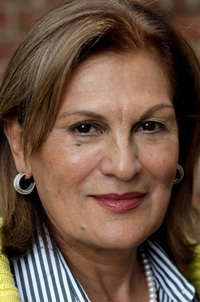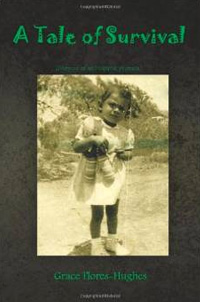This week, TheLatinoAuthor.com is featuring author Grace Flores-Hughes. Not only did Ms. Flores-Hughes have an impressive career working for the Department of the Air Force and the Department of Health, Education & Welfare in a management capacity, but she helped coin the term “Hispanic” for the federal government. She also served under the administrations of President Reagan and President H.W. Bush in other management capacities. Below is the wonderful and candid interview with Ms. Flores-Hughes. A truly remarkable story!


Can you begin by telling us a little bit about your background? In other words, what is it that you would like our readers to know about you?
I was born and raised in a heavily segregated town in south Texas. The discrimination I experienced as a young child made me stronger but there were times I simply wanted to give up as many of my classmates did. But life on the Southside where we Mexicans lived wasn’t necessarily any better – the lack of support from family and friends to make something of myself was discouraging at best, never mind the countless cases of physical and verbal abuse that afflicted my everyday life.
You have an extensive career working in the Federal government and have been appointed to positions by both President Ronald Reagan and President George G.W. Bush. These are prestigious accolades. With these high government positions, how did you make the switch to writing or was this something that you always wanted to do?
I’ve wanted to tell my story to inspire others so the idea of a book was always in the back of mind. When I left the G.W. Bush administration, I decided it was time to finish the book once and for all. After my book was published, I began writing for VOXXI.COM and didn’t realize how much I enjoyed doing that…I am now a weekly Contributor to VOXX and couldn’t be happier…
When entering the literary world, what did you find as the most challenging? The writing, publishing, or the marketing part of the business? Please elaborate.
Most challenging is Publishing – unless you are Jennifer Lopez with a sensational story to tell, your chances of getting published by a major New York publishing company are slim and none…this process is terribly frustrating especially when you hear one editor after another turn you down and it is even more frustrating to hear it from the type of person that has preconceived notions about the Hispanic community, none of them good. Although things are changing in the publishing with the hiring of more and more Hispanic editors… still it can be a lengthy and discouraging process.
Getting the attention of a major New York or LA publishing company is terribly difficult. I kept being told that Hispanics don’t read as much as other groups thus we are not a group they care to chase. Also, it takes a long time for a publisher to review an author’s material so if you want your story out soon, best to go another route. In my case I was encouraged by the many authors preferring to self publish – in the old days this was seen as a losing proposition. But in today’s changing media world, it is a respected choice. I chose to self publish with Authorhouse and I couldn’t be happier with the decision. They use the same book distribution center as major publishers and just as important my book will never be out of circulation.
Marketing – you have to have CONTACTS to get your book out to the public. There are numerous venues such as social media, book festivals, book clubs, book signing parties to market your book but it takes A LOT of work to constantly keep the book on the public’s eye. I am fortunate to have built a large network of friends and associates that have helped to market my book. I take a copy or two, everywhere I go – I even sold a couple a books at a funeral. The selling part is a forever job but so much fun and so rewarding.
You’ve written a book that’s titled A Tale of Survival. This book is a story detailing an American story of adversity and perseverance at a time when it was extremely difficult for Mexican Americans to attain ‘The American Dream’, yet you surpassed this and more. How and when did you decide to write this memoir?
I began to think about writing my story the day I left Taft for college in 1965. I simply couldn’t believe I had managed to escape such a painful and challenging environment and wanted more than anything to write about it – to inspire others. But as the years went by and I kept moving up in different positions within the federal government both as a civil servant and later political appointee I figured I could add that to my early childhood story, again to inspire.
In writing this memoir, it must have been difficult to relive some of your experiences and hardships. How did you work through those moments to ensure that you captured the true essence of your story on paper?
I can’t say how many times I wept as I wrote about a painful experience but the more I wept the more I knew I had a story to tell and of course the more I released so much of my angst, the better the story grew.
What steps would you recommend a writer take before beginning a memoir?
A famous female writer said recently at a book signing, “If you had a happy childhood, you don’t have a story to tell.” This couldn’t be truer – your story must be compelling, different and above all real. You are the voice of your story and that voice must be heard throughout. I told painful truths about my family but I didn’t do it to hurt them or to tell on them as much as I did to capture the reader’s imagination and appreciation about my upbringing in a single parent household and about the town of Taft and the people in it.
If you could give one final bit of advice, inspiration, or encouragement to a memoirist, what would it be?
Tell your story as you experienced it – don’t worry about what friends or family will say. Too often as Hispanics we are too conservative about telling what really happened in our lives. A reader gets more out of your story if you tell it as it happened and in turn you will release so much of what held you back emotionally.
How long did it take you to write this book?
About 10 years on and off….
If you could do it all over again, is there anything that you would change?
No, I told the story of my life as it happened – I was brutally honest but thoughtful.
What was your source of inspiration to get this memoir completed?
My mother and my maternal grandfather because the stories they told me about our family were rich and compelling. My husband was also extremely helpful. He above all encouraged me to be honest about my story, not to be afraid where the story would take me…
What’s next for you? Can you tell us about any new projects that are in the immediate future?
I would truly like to write another book – perhaps about America’s attitude toward newly arrived immigrants from Spanish speaking countries this in light of the recent unaccompanied minor border crisis in south Texas. I also want to spend more time in college campuses especially those with predominant Latino student populations to talk about my story while encouraging them to finish their studies and not be afraid what they can accomplish.




